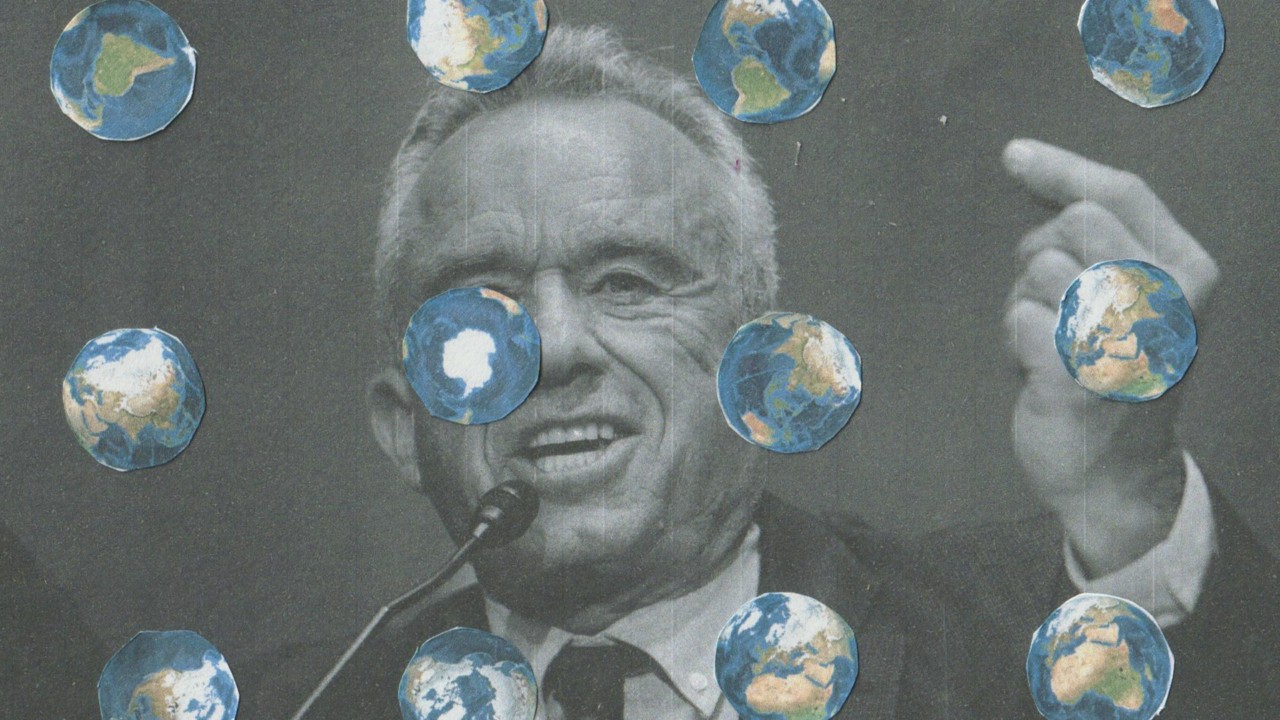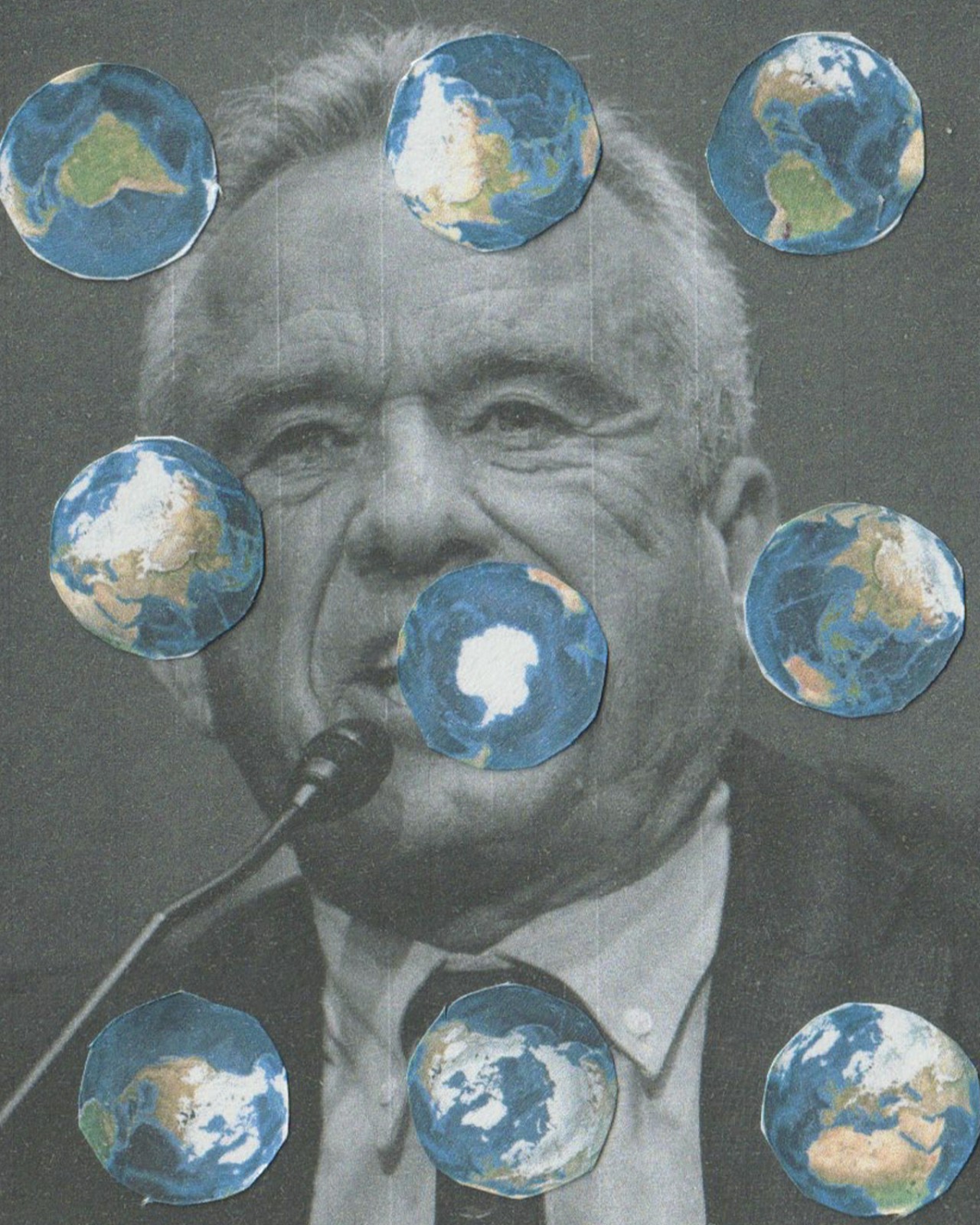

Photograph by Andrew Harnik / Getty Images
words by miranda green
artwork by tessa forrest
Right in time for back to school, Health and Human Services Secretary Robert F. Kennedy Jr. released yesterday his comprehensive plan to “Make Our Children Healthy Again.”
The highly anticipated, 20-page strategy document outlines areas of promised federal focus that range from soil health and fluoride to women’s fertility and vaping.
What it doesn’t mention at all is climate change.
RFK Jr. stands out in the Trump administration. Not only is he married to a vaccine-skeptic celebrity, and had a brief scandal with a reporter who covered him, but he’s also a former Democrat who spent nearly three decades working as an environmental lawyer. His work was once considered so poignant that in 1999, Time Magazine dubbed him one of the “Heroes for the Planet.”
At first, RFK Jr. highlighted his background as making him more qualified. He told senators at his confirmation hearings earlier this year that, unlike Trump, he does believe in global warming.
“I believe climate change is existential, my job is to make Americans healthy, again,” RFK Jr. told Independent Vermont Sen. Bernie Sanders after a particularly heated back-and-forth. He was later confirmed by the narrowest margin of any of Trump’s picks.
But his supposed conviction in climate change did not extend to economic investment. Two days after Kennedy was confirmed, he cut climate change and health programs at the National Institutes of Health, which included the elimination of the Climate Change and Health Initiative, the Climate Change and Health Research Coordinating Center, and the Climate and Health Scholars Program. Their websites no longer exist.
Now, Kennedy has taken on the mantle of “Making America Healthy Again” while failing to consider climate change, which the UN calls “the single biggest health threat facing humanity.”
“The understanding that climate change has a huge impact on living systems is very well accepted,” Camilo Mora, a professor of data analytics at the University of Hawai’i, tells me. “That understanding is so basic that when we are told that the climate is changing, we automatically understand that biological systems are going to be affected. In fact, life itself wouldn’t be possible if it wasn’t at the right temperature, right?”
Mora published a study in 2022 that found nearly 60% of all known infectious diseases have been aggravated by climate change–which means climate is not only making infectious diseases more common in humans, but also worse.
Mora gave me some examples that were each worthy of their own Contagion-esque horror film: bats driven by warmer weather to live closer to humans, further exposing children to the Hendra virus from their guano; snails, which harbor a water-borne parasitic disease worldwide, more readily able to infect humans after major flooding events; and an incident in Russia where a 12-year-old boy became infected with Anthrax by a 20th-century reindeer carcass that had been exposed due to melting frozen soil.
These are the issues that Mora worries won’t be studied under the new MAHA policy.
“It’s hard for me as a scientist to understand what could be the reason for them to do something that is going to be so damaging to so many people,” he said.
Aside from vaccine skepticism, one of the MAHA movement’s biggest stated concerns is toxins—namely those RFK Jr. purports are abundant in the “industrial waste” that is fluoridated water, and food additives. Some concerns are more scientifically salient than others. Earlier this year, Kennedy announced plans to phase out eight artificial food dyes. Jell-O snacks, Kool-Aid beverages, Lucky Charms cereals, and other big names responded by volunteering to rid their products of synthetic dyes by 2028. The dyes Kennedy and his supporters are worried about are petroleum-based. Yes, that petroleum.
What makes the MAHA movement distinct is not the topics it chooses to care about, but those it does not. For example, petroleum based dyes, check. Petroleum drilling? Nope. Toxics, check. Toxics linked to climate change and air pollution? Not so fast.
Joshua Rosenthal, an environmental health scientist who worked at the NIH, tells me this is a short-sided vision perpetuated by HHS and its “Quack in Chief,” Kennedy.
“There are substantial health burdens associated with the distribution of toxins after flooding, after wildfires, after many extreme weather events, and we know that extreme temperatures make many people more biologically susceptible to toxins, especially the elderly or others who have previous health conditions,” said Rosenthal.
Rosenthal retired earlier this year after a long tenure as a senior scientist at the Fogarty International Center at the NIH. He was also the co-chair of the now-eliminated NIH Steering Committee on Climate Change and Health. The initiative focused on how climate change and associated extreme weather impacts human health, from waterborne diseases and toxins in floods to increased frequency and intensity of extreme heat days and wildfires.
Scientists say studying human health in 2025 without considering climate change is like a surgeon choosing to operate blindfolded.
“Is it possible? Yes. Is it Smart? No,” Matthew C. Phillips, a doctor in the Division of Infectious Diseases at Massachusetts General Hospital, tells me.
“Climate change is such an all-encompassing crisis; it affects all aspects of the environment, and we live in the environment, and so human health can’t be separated from the environment that we live in, and the environment that we live in is dramatically changing because of climate change,” he said.
Last week, RFK Jr. found himself in the hot seat once again—this time talking about vaccines.
I’ve sat through many of these hearings in person throughout my career. They are all long, overly air conditioned, and largely theatrical. But this one stood out, because unlike the unanimous support we’ve seen behind the majority of Trump’s picks for his administration– RFK was blasted from Republicans as much as Democrats.
He was criticized by Republican senators Bill Cassidy of Louisiana and John Barrasso of Wyoming, from gas and coal states respectively, but also trained physicians.
Barrasso told Kennedy: “I’m a doctor. Vaccines work.”
Their pushback was the highlight of an entire cable news cycle. Republicans, standing up for science? It was, in fact, groundbreaking.
But not all science, it seems. Barrasso is the former chair of the Senate Energy and Natural Resources committee and believes “clean coal can fuel the future.”
It made me think back to something Rosenthal told me. Unlike surgeons, who can see impacts right away, climate science is complicated and needs to be observed over time. You need to trust it. And by trusting it, it then means you have a moral imperative to do something about it.
The Supreme Court last month upheld the Trump Administration’s cuts of more than $2 billion in NIH research grants. Scientists trying to still work in the areas of climate change are forced to consult a leaked list that breaks down what areas of study will get rejected by the NIH, such as studying why the climate is changing or measuring the impacts of climate mitigation.
But for some in the field, public sentiment gives them hope.
Nearly 50% of Americans think people are being hurt by global warming in the U.S. “right now,” And 69% believe large businesses and corporations are not doing enough to help reduce climate change’s effects. Six in 10 cast the same blame at state elected officials.
Globally, 56% of respondents from one study from the United Nations Development Programme, in collaboration with Oxford University, said they think about climate change daily or weekly, and 78% want more protections for those at risk from extreme weather.
Another positive? Millennials and Gen Z on a whole believe in climate change more than previous generations—and they have already become the largest voting block.
The final element is the reality of time. The impacts of climate change on public health are unavoidable and are already being experienced globally. For better or worse, scientists and researchers know their work will soon be impossible to ignore.
A lot has happened since last week’s newsletter on Trump’s offshore wind vendetta.
– Surprise: It wasn’t a coincidence. At least six agencies coordinated their plans to hinder offshore wind development, including freezing funds and adding more bureaucratic hurdles.
-The international company that was blocked from finishing its nearly complete work on the Rhode Island wind development sued the government, as did attorneys general of Rhode Island and Connecticut.
-In Virginia, Republican Rep, Jen Kiggans and Republican Sen. Glenn Youngkin came out swinging in support of the state’s nearly finished offshore wind project.
Want me to look into The Understory of something? Send me an email!
MAHA Has a Climate Change Blind Spot